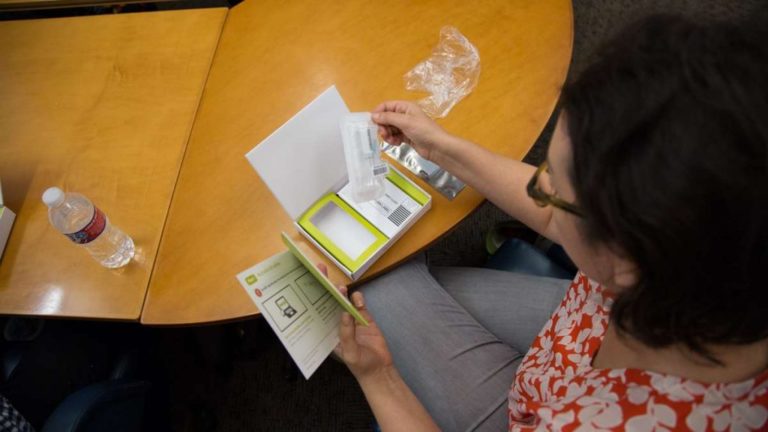N.J. lawmaker wants to make DNA test results your personal property
The proposal is a bid to give consumers who use popular genetic testing services more control over their personal data.

Dr. Allison Kolpas, a professor in the math department at West Chester University, opens her DNA testing packet. (Emily Cohen for WHYY)
A proposal in New Jersey would make the results of a DNA test the sole property of the person tested, a bid to give consumers who use popular genetic testing services more control over their personal data.
Assemblyman Roy Freiman, D-Somerset, said that people have a right to know where their personal genetic data is going, even if it is used for good causes.
“We don’t want to impede upon breakthroughs in medical technology and advances and cures,” Freiman said, “but there’s also a balance of: what about the individual?”
Tens of millions of people have sent away DNA samples to companies like Ancestry.com and 23andMe to learn more about their health or family history. But few of us know where that data goes later, when companies sell it to drug makers and technology firms or share it with law enforcement.
The use of genetic data for other purposes is not new. In 2018, 23andMe inked a deal with pharmaceutical giant GlaxoSmithKline to use genetic data to create new medications. A few months earlier, police in California used the genealogy website GEDmatch to catch Joseph James DeAngelo, also known as the Golden State Killer. The list goes on.
But Ellen Goodman, a professor at Rutgers Law School, said the New Jersey proposal would mean serious penalties for companies that sell or share genetic data without approval.
“If they didn’t get your consent and they shared it, you would actually have an action against them for theft. It’s really treating it like your personal property,” Goodman said.
Alaska has a similar law that considers genetic information and DNA results personal property, but Goodman said about half of states have less aggressive privacy laws addressing genetic information. There is no federal law regulating genetic privacy.
Freiman said he intends to hold at least one hearing on the bill (A-1170) to learn about any unintended consequences of the proposal, such as how it could hinder the work of police seeking a DNA sample from a suspect or medical professionals searching for clues to an illness. The bill is not yet scheduled for a hearing or a vote.
WHYY is your source for fact-based, in-depth journalism and information. As a nonprofit organization, we rely on financial support from readers like you. Please give today.




